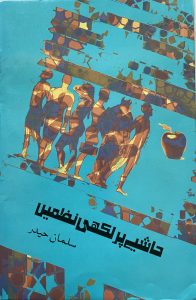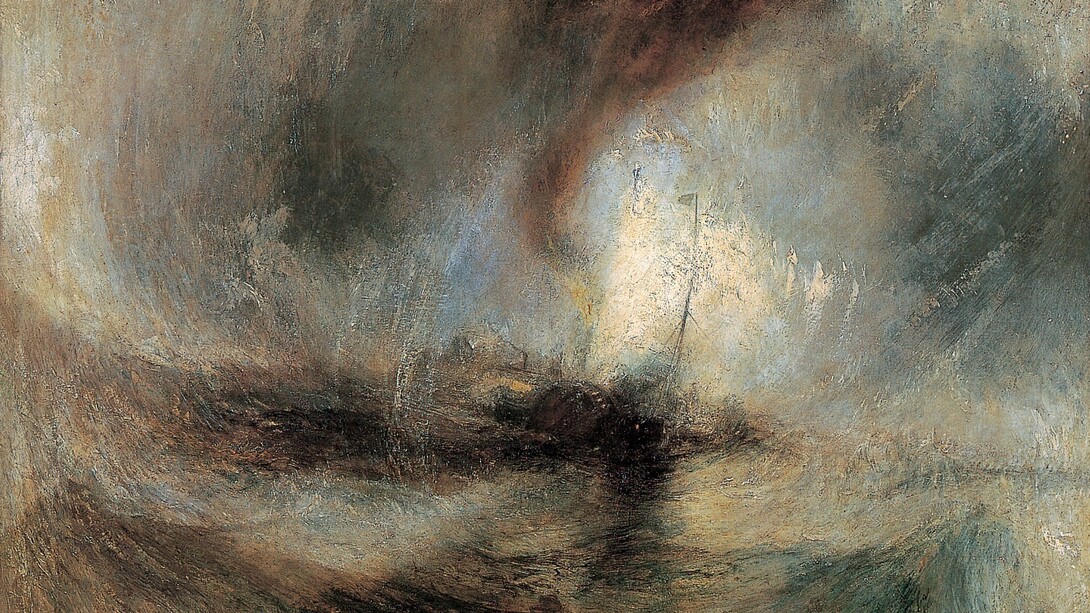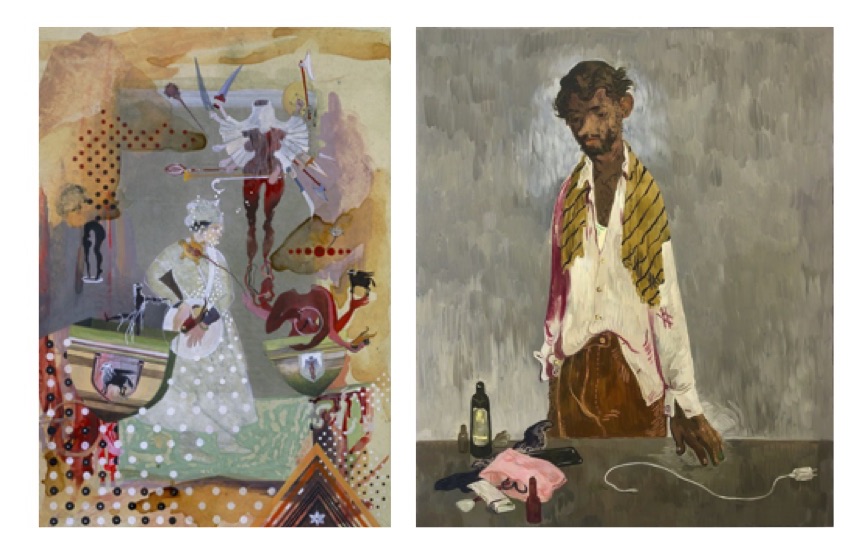A Poem Outside the Page
Currently, the roster of the disappeared features the friends of my friends
Next up are my friends
and after them — me
I am going to become the file
that my father will take to court
or the photograph which my son will kiss at a reporter’s prompting
or the silence which my wife will wrap around herself
or the burbling drone of my mother before she blows blessings on the photograph
or the number by which I shall be summoned in some jail
or the crime which was never committed
or the confession which I signed before being abducted
or the judgment rendered before that confession
or the punishment meted out in equal measure to me and my people
or the law whose stench disgusts civilized nostrils
or the commission who wears the perfume of that law
or the poem that the friend of my friend will write tomorrow
Yes, I am a poem
There is an image imprisoned in the page facing me
In his half open mouth one lip blossoms into a kiss and the other is stained with a mumbling hum
The frame next to it contains a file
and in the adjoining drawer??
Crime, confession and punishment, neatly stacked, perhaps.
I can’t open that drawer
To do that I would have to step outside my page
It’s a crime for poems to escape their pages
As grave as freeing books from the confines of cabinets.
 صفحے سے باہر ایک نظم
صفحے سے باہر ایک نظم
ابھی میرے دوستوں کے دوست لاپتہ ہو رہے ہیں
پھر میرے دوستوں کی باری ہے
اور اس کے بعد…
میں وہ فائل بنوں گا
جسے میرا باپ عدالت لے کر جائے گا
یا وہ تصویر جسے میرا بیٹا صحافی کے کہنے پر چومے گا
یا وہ چپ جو میری بیوی پہنے گی
یا وہ بڑبڑاہٹ جو میری ماں تصویر پر پھونکنے سے پہلے گنگنائے گی
یا وہ عدد جس سے میں کسی قید خانے میں پکارا جاؤں گا
یا وہ گناہ جو کبھی سرزد نہیں ہوا
یا وہ اعتراف جس پر میں نے اغوا ہونے سے پہلے دستخط کر دیے تھے
یا وہ فیصلہ جو اس اعتراف سے پہلے لکھا جا چکا تھا
یا وہ سزا جو مجھ پر اور میرے لوگوں پر برابر تقسیم کر دی گئی
یا وہ قانون جس کی بساند سے تہذیب یافتہ نتھنے گھن کھاتے ہیں
یا وہ کمیشن جو اس قانون کا پرفیوم چھڑک کر میز پر بیٹھتا ہے
یا وہ نظم جو میرے دوست کا دوست کل لکھے گا
ہاں میں ایک نظم ہوں
میرے سامنے والے صفحے پر ایک تصویر قید ہے
جس کے ادھ کھلے ہونٹوں کی ایک باچھ پر بوسہ کھلا ہوا ہے اور دوسری گنگناہٹ سے لتھڑی ہوئی ہے
اس کے برابر فریم میں ایک فائل ہے اور ساتھ والی دراز میں؟؟؟
شاید گناہ اعتراف اور سزا رکھے گئے ہوں
میں وہ دراز نہیں کھول سکتا
اس کے لیے مجھے اپنے صفحے سے نکلنا پڑے گا
نظموں کا صفحوں سے باہر نکلنا جرم ہے
کتابوں کو الماریوں سے رہا کروانے کی طرح سنگین۔۔۔۔۔
Page From the Diary of a Disappeared Man
The sun of the search tower, orbiting
endlessly in the floodlit night
in front of blindfolded eyes
marks the circumference of existence.
Days are spent counting the cold tiles of this planet with the soles of my feet.
A planet whose north pole is nine paces away from its south pole.
In order to keep me alive until tomorrow the door of sustenance opens thrice a day.
I’ve become an expert at balancing the spilling plate of manna wearing handcuffs.
Even made the discovery that
an index finger grazed across the neck
causes the forehead to break out in a sweat.
I might have found it difficult to fill up my drinking water
from the same tap underneath which I empty my urine bottle
if the silence between curses and blows did not make me fear I was dead.
The pores of my fingers have memorized all those names scratched into the walls
who found the world of violence before me.
لاپتا شخص کی ڈائری کا ایک ورق
زندگی کا ہیولہ سرچ ٹاور پر گھومتے سورج کی طرح
سیاہ پٹی سے ڈھکی آنکھوں کے سامنے
رات جیسے دن میں کئی بار گزرتا ہے
دن جو کرہ ارض پر بچھی سرد ٹائیلیں تلووں سے گننے میں صرف ہوتا ہے
کرہ ارض جس کا شمالی قطب اس کے جنوبی قطب سے نو قدم دور ہے
رزق کا دروازہ مجھے کل تک زندہ رکھنے کےلیے دن میں تین بار کھولا جاتا ہے
میں من و سلوی کی چھلکتی پلیٹ ہتھکڑی لگے ہاتھ سے سنبھالنے میں مہارت حاصل کر چکا ہوں
مجھے یہ بھی معلوم ہو چکا کہ شہادت کی انگلی گلے پر پھیری جائے تو پسینہ پیشانی سے پھوٹتا ہے
پیشاب کی بوتل جس نل کے نیچے خالی کی جاتی ہے اس میں سے پینے کا پانی بھرنا مشکل ہوتا
اگر گالیوں اور کراہوں کے بیچ کی خاموشی پر مجھے موت کا گمان نا ہوتا
انگلیوں کی پوریں دیوار پر کھدے وہ سب نام یاد کر چکی ہیں
جنہوں نے جبر کی دنیا مجھ سے پہلے دریافت کی۔۔۔
Penalty for Missing Poems
I am not demanding that you repay me
for the fear that throbs in my son’s temples
as he sleeps with arms tightly clasped around my neck
I don’t want recompense for the disbelief
trembling in my mother’s fingers
while dialing my number.
The levy of helplessness
breaking in my father’s voice
as he sent me away from him
far exceeds your annual budget.
The anthems of your bravery cannot be heard
on the other side of the soundproof silence
wrapping the greetings I receive each festive season.
You are not capable of coming back for seven lifetimes
to return my twenty one days
How can you pay me the price of my three poems
that are still protesting your callous indifference
in the record room of some nameless jail.
Your puffed up chests ensconced in perfectly pressed uniforms
cannot withstand the pride I feel in my freedom
crushed underneath your gleaming boots.
Your tyranny is shopworn, like all the tyrannies of the world.
My dream is new like all the dreams of the world.
گمشدہ نظموں کا تاوان۔۔۔
میں تم سے اس خوف کا حساب نہیں مانگتا
جو میرے گلے میں ہاتھ ڈال کر سوتے ہوئے
میرے بیٹے کی کنپٹیوں میں دھڑکتا ہے
مجھے اس بے یقینی کا تاوان نہیں چاہئیے
جو میری ماں کی انگلیوں میں
میرا فون نمبر ملاتے ہوئے لرزتی تھی
اس بے بسی کا ہرجانہ
تمہارے سالانہ بجٹ سے کہیں زیادہ ہے
جو مجھے خود سے دور بھیجتے ہوئے
میرے باپ کے لہجے میں ٹوٹ گئی
تمہاری بہادری کے ترانوں کی دھن
اس ساونڈ پروف اداسی کے پار سنائی نہیں دے سکتی
جس میں لپٹے پیغام مجھے ہر تہوار پر ملتے ہیں
میرے اکیس دن واپس کرنے کے لیے
تمہارا سات بار جنم لینا تمہارے بس میں نہیں
تم مجھے ان تین نظموں کی قیمت کیا دو گے
جو کسی قید خانے کے ریکارڈ روم میں تمہاری بے حسی پر آج بھی احتجاج کر رہی ہیں
مجھے تمہارے چمکتے ہوئے بوٹوں تلے
کچلی ہوئی آزادی پر جتنا فخر ہے
تمہارے بے شکن وردیوں میں تنے ہوئے سینے
اس کے متحمل نہیں ہو سکتے
تمہارا جبر دنیا کے ہر جبر کی طرح فرسودہ ہے
اور میرا خواب دنیا کے ہر خواب کی طرح نیا۔۔۔۔
This is not a Eulogy
I am missing
and my friends
are waiting for me to die
while drinking tea
they are thinking about my virtues
which they will embroider
in my eulogy.
I was a good man
I never protested
Protest is beyond the scope of literature
It is full of slogans
which are not literary
The government considers them objectionable
I have also written three and a half poems
on fifty missing persons
but they are going to debate
whether they should mention those poems in the eulogy or not
This, like protest is an act
beneath the dignity of literature.
They have ordered tea
After drinking it they will write my eulogy
A eulogy can garner praise
which is most definitely literary
If they find some activists
they can outsource the protests over my disappearance to them
They have filed an application with the government
to cover the expenses of this job
The paper and pens for the protest
will be bought with government assistance
and it will also pay for the tea
which they will drink while planning this event.
Speaking of tea, I just remembered
that they are starving in my sorrow on the very table
where I used to sit with them and drink tea
A conference of condolence
cannot be conducted for those who have gone missing
or else discourses would have been written on me
and my surviving kin could have paid for the cups of tea
consumed at the conference of condolence that never took place
They would never need to think about it
just drink tea and thank God
that they didn’t have to protest at anyone’s death
It is quite sufficient to drink tea and be involved
in literary activities such as writing eulogies
Although if tea were to be replaced by coffee
could protest be considered a literary activity?
If it were so
my survivors would be ready to pay for it as well.
یہ مرثیہ نہیں ہے
میں لاپتہ ہوں
اور میرے دوست
میرے مرنے کے منتظر ہیں
وہ چائے پیتے ہوئے
میری صفات کے بارے سوچ رہے ہیں
جن کا ذکر
وہ میرے مرثیے میں کریں گے
میں نیک آدمی تھا
میں نے کبھی احتجاج نہیں کیا
احتجاج ادیبوں کے منصب سے فرو تر ہے
اس میں نعرے لگائے جاتے ہیں
جو ادب نہیں ہوتے
حکومت کو انہیں بے ادبی سمجھتی ہے
یوں تو میںں نے پچاس لاپتہ ہونے والوں کے بارے
ساڑھے تین نظمیں بھی کہی ہیں
لیکن وہ اس بارے بحث کریں گے
کہہ ان نظموں کا ذکر مرثیے میں کیا جائے یا نہیں
یہ احتجاج کی طرح
ادب کے منصب سے گرا ہوا کام ہے
انہوں نے چائے منگوا لی ہے
جسے پی کر وہ میرا مرثیہ لکھیں گے
مرثیے پر داد حاصل کی جا سکتی ہے
جو سراسر ادبی ہوتی ہے
انہٰیں کچھ ایکٹوسٹ بھی مل جائٰیں
تو وہ میری گمشدگی پر احتجاج کا ٹھیکہ دے سکتے ہیں
انہوں نے اس ٹھیکے کے اخراجات کے لیے
حکومت کے پاس درخواست جمع کروا دی ہے
حکومتی امداد سے احتجاج کے لیے درکار
کاغذ اور قلم خریدے جائیں گے
اور اس چائے کی قیمت ادا کی جائے گی
جو وہ اس احتجاج کی منصوبہ بندی کے دوران پئیں گے
چائے سے مجھے یاد آیا
کہ وہ اسی میز پر بیٹھے میرے غم میں دبلے ہو رہے ہیں
جس پر میں ان کے ساتھ چائے پیاکرتا تھا
لاپتہ ہونے والوں کا
تعزیتی ریفرنس معقد نہیں کیا جاتا
ورنہ وہ مجھ پر مقالے لکھ چکے ہوتے
اس نہ ہونے والے تعزیتی ریفرنس کے بعد چائے کی رقم
میرے لواحقین ادا کر سکتے ہیں
سو اس کے بارے سوچنے کی ضرورت انہیں نہیں پڑے گی
وہ چائے پی لیں تو خدا کا شکر ادا کریں گے
کہ لوگوں کے مرنے پر انہیں اس کے خلاف احتجاج نہیں کرنا پڑتا
صرف مرثیہ لکھنے اور چائے پینے جیسی ادبی سرگرمیوں میں
ملوث ہونا کافی ہوتا ہے
ویسے چائے کی جگہ اگر کافی مل سکے
تو احتجاج کو ادبی قرار دیا جا سکتا ہے؟
اگر ایسا ہو
تو میرے لواحقین
اس کے لیے بھی پیسے دینے کو تیار ہوں گے۔۔۔
Condemned
The date on my label had not expired yet
When they unscrewed my head
removed the lid
and after one look
left it like that
Before twisting my knees
they yanked my ankles from their cuffs
and stuffed them into the back pockets of my pants
My hands were separated by a handspan from my spine
So, having failed in the attempts to tie them at my navel
they were squeezed into my armpits instead.
I began to resemble an old man in a blizzard
whose teeth are so far apart they can’t chatter loudly
Elbows were stuffed in the sticks of my ribcage
like ragged pages of sacred books in the hollows of brick walls
(They didn’t forget to stamp their brass kisses on them)
Shoulders were pushed in
and my head was used to fill the space between knees and chest
Due to the failure of the mechanism of retraction and extension
my tongue was jammed in my teeth
Eyes came out of their sockets to look at him
Look how interesting he is, one said
Interesting? Terrifying, say terrifying said the second
Terrifying is also kind of interesting, a third replied
as he picked me up to throw on a garbage heap.
کنڈم
میرے لیبل پر لکھی مدت ابھی باقی تھی
جب انہوں نے میری کھوپڑی کے پیچ کھول کر
اس کا ڈھکنا ہٹایا
اور ایک نظر ڈال کر
اسے یونہی چھوڑ دیا
میرے گھٹنے موڑنے سے پہلے
میرے پیر ٹخنوں کی چوڑیوں سے کھولے
اور انہیں میری پتلون کی پچھلی جیب میں سنبھال دیا
میرے ہاتھ ریڑھ کی ہڈی سے
بالشت بھر نکلتے تھے
سو ناف پر باندھنے کی کوشش میں ناکام ہو کر
انہیں میری بغل میں دبا دیا گیا
میں برف باری میں کپکپاتے بوڑھے جیسا دکھنے لگا
جسکے دانت اپنے بیچ خلا کی وجہ سے
اچھی طرح بج نہیں سکتے
کہنیاں پسلیوں کے پنجرے کی تیلیوں میں
اس طرح ٹھونس دی گئیں
جیسے مقدس ورق اینٹوں کی درز میں
سنبھال دیے جاتے ہیں
(وہ ان پر تانبے کے بوسے ثبت کرنا نہیں بھولے)
کندھے اندر کو دھکیلے گئے اور
سینے اور گھٹنوں کے بیچ پیدا ہونے والا خلا بھرنے کے لیے
میرا سر استعمال کیا گیا
اندر باہر کرنے والا میکنزم خراب ہونے کی وجہ سے
زبان بھنچے ہوئے دانتوں میں پھنس چکی تھی
آنکھیں اسے دیکھنے اپنے ساکٹ سے باہر نکل آئیں
دیکھو یہ کتنا دلچسپ ہے ایک نے کہا
دلچسپ؟؟؟ خوفناک کہو خوفناک دوسرا بولا
خوفناک بھی ایک طرح کا دلچسپ ہوتا ہے
تیسرے نے جھرجھری لیکر کہا
اور مجھے کچرے کے ڈھیر پر پھینکنے کے لیے اٹھا لیا۔۔۔
Editor’s note: The original poems in Urdu appear after the translation.
Salman Haider is a poet, playwright, political satirist, human rights defender and university professor who has been living in exile in Canada since 2017. He left Pakistan after being abducted and tortured for political dissent. He was falsely accused of blasphemy in retribution for being a part of an ongoing struggle to get fundamental rights for religious and ethnic minority communities in Pakistan. He is also a micro blogger, using social media platforms to serve the cause of human rights.
His first poetry collection, Hashiye par Likhi Nazmein ( Poems From the Margins) was published by Maktaba-e-Danyal, one of the most prestigious publishing houses in Pakistan in 2021. While working with Theatre Wallay he has written and acted in several plays, one of which was staged in collaboration with the theater department of Ithaca College, NewYork in 2015.
Haider has also been writing political satire since 2012 and has been a regular contributor to Dawn Urdu, the most prominent Urdu media website in Pakistan. He is currently working as a part time writer and psychotherapist in Canada.
Sophia Naz is a bilingual poet, author, editor and translator. She has been nominated twice for the Pushcart Prize; in 2016 for creative nonfiction and in 2018 for poetry. Her work features in numerous literary journals and anthologies, notably The Penguin Book of Modern Indian Poets, Singing in the Dark:A Global Anthology of Poetry Under Lockdown,Berfrois,The Bombay Literary Magazine, The Punch Magazine, Poetry At Sangam, Poetry International Rotterdam, The Adirondack Review, The Wire, Chicago Quarterly Review, Blaze Vox, Scroll, The Daily O, Cafe Dissensus, RAIOT, Ideas And Futures, Chapati Mystery, Guftugu, Pratik, Gallerie International, Coldnoon, VAYAVYA, The Bangalore Review, Papercuts, Madras Courier, The Yearbook of Indian Poetry and many others.
Naz’s poetry has been taught in the curriculum of Ethnopoetics taught by Jason Zuzga in ModPo ( Modern & Contemporary American Poetry) an online course offered by the University of Pennsylvania. Naz has worked as an editor and translator at the periodical City, as an editor at the Sunflower Collective and guest edited an issue of Poetry at Sangam. She has authored the poetry collections Peripheries, Pointillism, Date Palms and Shehnaz, a biography. Open Zero is her fourth poetry collection, published in September 2021 by Yoda Press. Sophia lives in Glen Ellen California and can be found online at www.SophiaNaz.com



